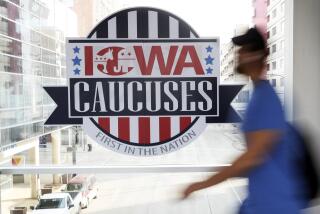Iowans Like Bush Stance on Arms Treaty
AMES, Iowa — For Paul Goodland, the Washington summit changed everything.
Four months ago, he picked the side of Republican presidential candidate Bob Dole. Both a minister and the three-term mayor of this university community, Goodland is not a trivial man and he was welcomed onto the Kansas senator’s political steering committee.
But in the hours after President Reagan and Soviet leader Mikhail S. Gorbachev signed the missile treaty, Goodland defected--to candidate George Bush.
Tells Why He Switched
He walked to the lectern at the Moose Lodge here and made his announcement before an audience of Bush supporters. He later explained:
“I didn’t think Dole was very enthusiastic about his support for the treaty. . . . I think Dole should have been the one to stand up and support it.”
That’s exactly the deep-rooted Iowa emotion the vice president reached for during a two-day campaign trip through central and eastern Iowa on Friday and Saturday. By virtually every measure, the treaty to eliminate intermediate-range nuclear missiles is extraordinarily popular in Iowa. And just as Bush’s political fortunes slumped when Reagan Administration polices were unpopular here, he now gloried in the Administration’s achievement.
“No state in America is more pro arms control than Iowa,” said Rep. Jim Leach (R-Iowa), part of Bush’s Iowa brain trust. “This is the key to the resurgence for George Bush.”
Dole Strategists Distressed
Even strategists for Dole began to express discomfort.
“I think there is some danger in Dole delaying an endorsement of the treaty,” said Dole’s Iowa campaign chairman, Steve Roberts.
“Politics shouldn’t always drive policy,” Roberts said Saturday. “But it would be helpful, at least in Iowa, to get the matter resolved.”
Meanwhile, Richard B. Wirthlin, pollster for Dole and the White House, said a survey of 600 Americans showed 77% in favor of the treaty.
That support may run stronger in Iowa, where there are no military bases and no defense industry. Pacifist roots run generations deep here in some communities. The signing of the missile treaty Tuesday was cause for widespread parties among peace groups here, parties that were covered locally as news events.
Bush’s Support of Treaty
Bush is alone among the six major GOP candidates in his wholehearted support for the treaty. Dole said he favors it in principle but has asked for time for further study and consideration of amendments. The other four contenders have been critical of the agreement.
At the same time, polls, at least until recently, showed Dole with a commanding lead among likely GOP voters in this state, where the primary season gets in full gear with the Iowa caucuses on Feb. 8.
Arriving Friday in Des Moines and then at stop after stop through Saturday, Bush was single-minded in his devotion to tales of the week in Washington.
“Making hay while the summit shines,” one wag said as the 14-car motorcade snaked through the farmlands.
Anecdotes About Gorbachev
Bush entertained audiences with anecdotes of his conversations with Gorbachev and, in a more serious vein, spoke of his hopes that the treaty would be followed by other agreements to limit long-range nuclear missiles and eliminate chemical weapons.
At one stop, Bush, perhaps without intending, found himself speaking, almost verbatim, the title line of one of the most famous anti-war songs of the generation: “I say, let’s give peace a chance.”
He also was gleeful in reminding each audience of the Thursday morning breakfast in Washington at which he invited two Iowans and one New Hampshire supporter, along with two others, to talk to Gorbachev.
Dole’s campaign complained that Bush was playing politics with the summit. But it seemed a difficult complaint to sell here, where voters are protective of the prerogatives that come from voting first.
“What are they saying, an Iowan isn’t good enough to eat with Gorbachev?” deadpanned Peter Teeley, Bush’s communications director.
More to Read
Get the L.A. Times Politics newsletter
Deeply reported insights into legislation, politics and policy from Sacramento, Washington and beyond. In your inbox three times per week.
You may occasionally receive promotional content from the Los Angeles Times.










